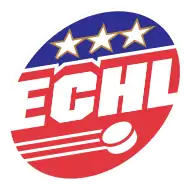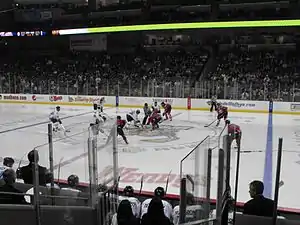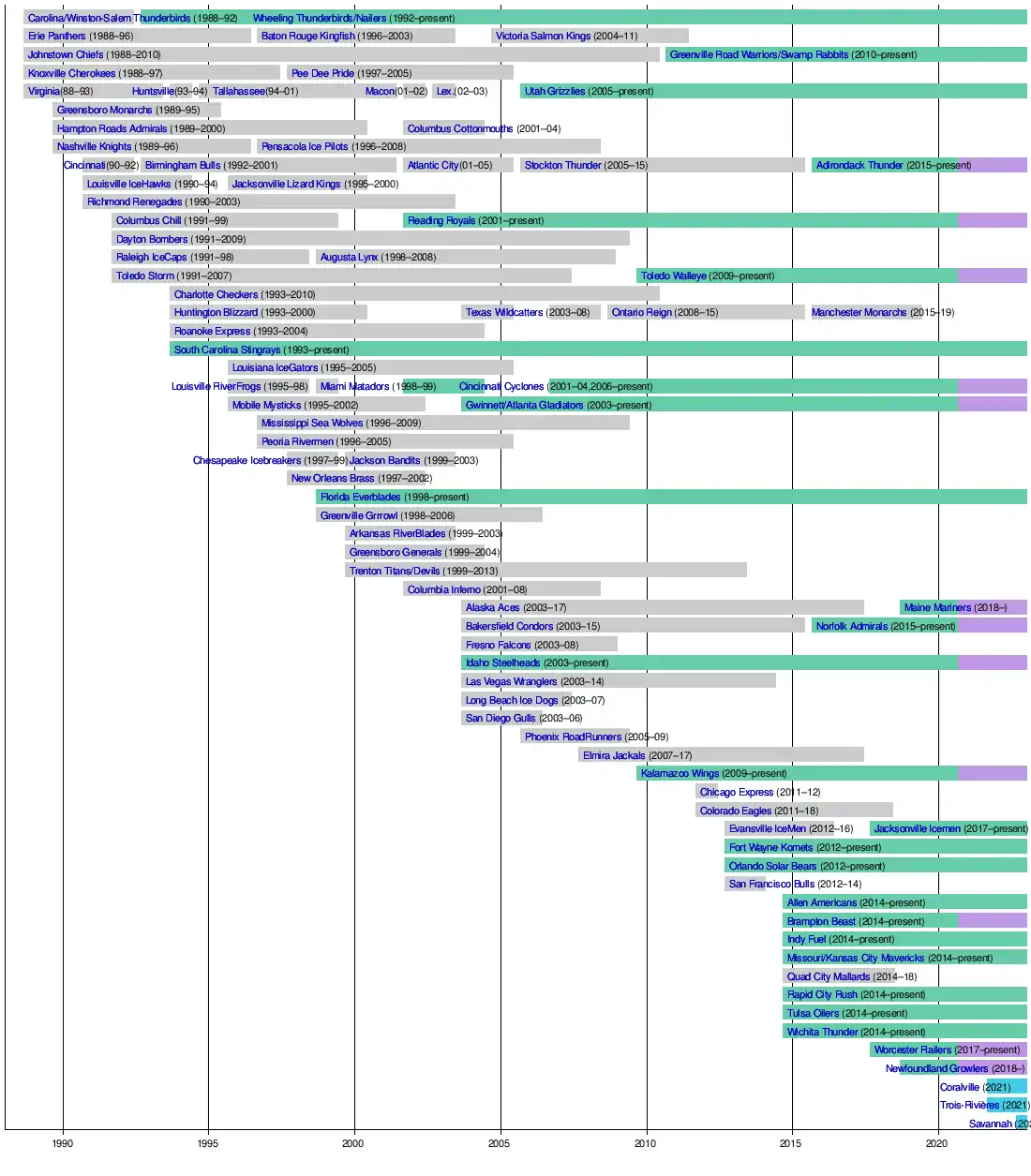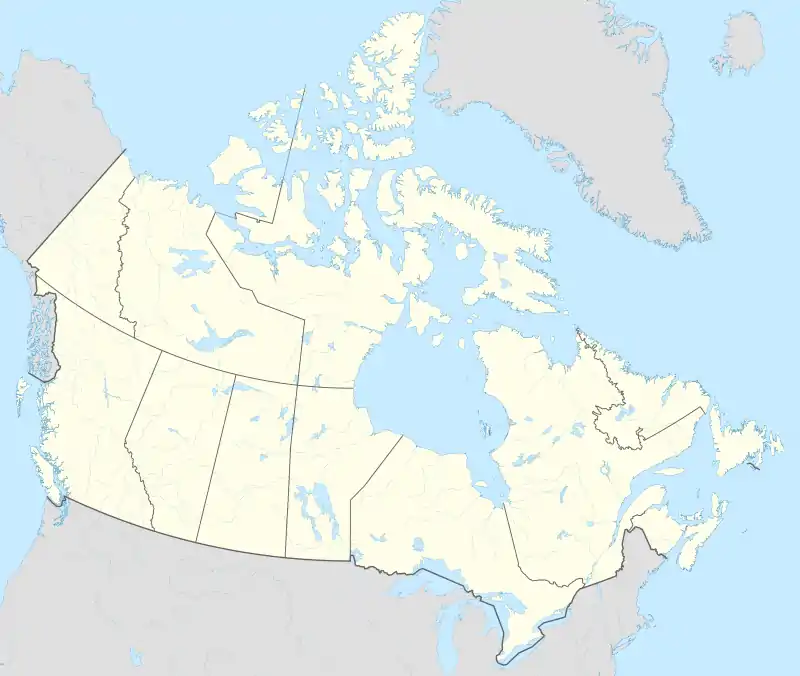ECHL
The ECHL (formerly the East Coast Hockey League) is a mid-level professional ice hockey league based in Princeton, New Jersey, with teams scattered across the United States and two franchises in Canada. It is a tier below the American Hockey League.
| Upcoming season or competition: | |
 ECHL Official logo | |
| Sport | Ice hockey |
|---|---|
| Founded | 1988 |
| No. of teams | 26 |
| Country | United States (24 teams) Canada (2 teams) |
| Most recent champion(s) | Newfoundland Growlers (1st title) |
| Most titles | Alaska Aces, Hampton Roads Admirals and South Carolina Stingrays (3 each) |
| TV partner(s) | Canada (English): Sportsnet/Sportsnet One Canada (French): TVA Sports United States: NHL Network |
| Official website | Official website |
The ECHL and the AHL are the only minor leagues recognized by the collective bargaining agreement between the National Hockey League and the National Hockey League Players' Association, meaning any player signed to an entry-level NHL contract and designated for assignment must report to a club in either the ECHL or the AHL.[1] Additionally, the league's players are represented by the Professional Hockey Players' Association in negotiations with the ECHL itself. Some 662 players have played at least one game in the NHL after appearing in the ECHL.[2]
For the 2020–21 season, 25 of the 31 National Hockey League teams have affiliations with either an active or dormant ECHL team[3] with the Carolina Hurricanes, Columbus Blue Jackets, Los Angeles Kings, Montreal Canadiens, St. Louis Blues, and San Jose Sharks having no official ECHL affiliations. The ECHL has one independent team, the Norfolk Admirals, which is also dormant for the 2020–21 season. However, NHL teams do sometimes lend contracted players to other unaffiliated ECHL teams for development and increased playing time.
The league's regular season typically begins in October and ends in April. The most recent ECHL champion is the Newfoundland Growlers, a 2018–19 expansion team that won the title in its inaugural season. There was no champion in 2020 due to the COVID-19 pandemic.
History
The league, which combined teams from the defunct Atlantic Coast Hockey League and All-American Hockey League, began play as the East Coast Hockey League in 1988 with five teams—the (Winston-Salem, North) Carolina Thunderbirds (now the Wheeling Nailers); the Erie Panthers (folded in 2011 as the Victoria Salmon Kings); the Johnstown Chiefs (now the Greenville Swamp Rabbits); the Knoxville Cherokees (ceased operations as the Pee Dee Pride in 2005; folded in 2009 following failed relocation efforts); and the Virginia Lancers (now the Utah Grizzlies).
In 2003, the West Coast Hockey League ceased operations, and the ECHL board of governors approved membership applications from the Anchorage/Alaska Aces, the Bakersfield Condors, the Fresno Falcons, the Idaho Steelheads, the Las Vegas Wranglers, the Long Beach Ice Dogs and the San Diego Gulls as well as from potential teams in Ontario, California, and Reno, Nevada. Alaska, Bakersfield, Fresno, Idaho, Las Vegas, Long Beach and San Diego began play in the 2003–04 season as expansion teams. In a change reflective of the league's now-nationwide presence, the East Coast Hockey League shortened its name to the orphan initialism ECHL on May 19, 2003. The ECHL reached its largest size to date (31 teams) that season before being reduced to 28 teams for the 2004–05 season.
The ECHL has attempted to be more tech-friendly to its fans. Some improvements on the league's website have included a new schedule and statistics engine powered by League Stat, Inc. (introduced in 2006), internet radio coverage for most teams, and pay-per view broadcasting of ECHL games through B2 Networks (a subsidiary of America One Broadcasting). In 2008, the league introduced the ECHL toolbar for internet browsers which gave users short cut access to statistics, scores, transactions, and news updates.[4]

At the annual ECHL Board of Governors meeting on June 15, 2010, in Henderson, Nevada, the Board of Governors approved changes to the names of the conferences and divisions. The former American Conference (comprising eleven East Coast and Midwest teams) was renamed the Eastern Conference, while the National Conference (consisting of 8 West Coast teams, including the league's only Canadian team at the time) was re-designated the Western Conference. Within the Eastern Conference, the East Division was renamed the Atlantic Division, and the Western Conference's former West Division was dubbed the Mountain Division.[5]
The league lost its only Canadian team with the folding of the Victoria Salmon Kings subsequent to the 2010–11 season,[6] but increased to 20 teams for the 2011–12 season with the addition of the expansion franchise Chicago Express[7] and the Colorado Eagles who previously played in the Central Hockey League.[8]
With the folding of the Chicago Express at the conclusion of the 2011–12 season and the announcement of expansion franchises in Orlando, San Francisco, Evansville, and Fort Wayne (both in Indiana and both from the Central Hockey League) the league played the 2012–13 season with 23 teams. That number dropped to 22 for the 2013–14 season with the folding of the Trenton Titans and subsequently fell to 21 with the mid-season folding of the San Francisco Bulls on January 27, 2014.
On October 7, 2014, the ECHL announced that the seven remaining active members of the Central Hockey League (the Allen Americans, Brampton Beast, Quad City Mallards, Missouri Mavericks, Rapid City Rush, Tulsa Oilers and Wichita Thunder) would be admitted as new members for the 2014–15 season. The addition of the former CHL teams plus the expansion Indy Fuel raised the number of teams to 28 and placed a team in Canada for the first time since 2011.[9]
Before the 2015–16 season, the AHL's creation of a Pacific Division led the three California ECHL teams to relocate to former AHL cities with the Bakersfield Condors, Ontario Reign, and Stockton Thunder relocating to become the Norfolk Admirals, Manchester Monarchs, and Adirondack Thunder, respectively.[10] By the 2018–19 season, the ECHL had also expanded into other markets recently vacated by the AHL in the Maine Mariners, Newfoundland Growlers, and Worcester Railers.
Teams

Confirmed for 2020–21
Due to the uncertainty of being able to host games in some locations caused by the COVID-19 pandemic, several member teams have not been able to confirm participation in the 2020–21 season. The following thirteen teams started play in December 2020.[11] All teams had a deadline to voluntarily opt out of the 2020–21 season by November 30,[12] but two teams were granted extensions to return to play in February 2021.[13][14] By January 2021, twelve teams had opted out of the season[15] and announced a conference alignment.[16]
Plan to return in February 2021
| Team | City | Arena | Founded | Joined | Head coach | NHL affiliate | AHL affiliate |
|---|---|---|---|---|---|---|---|
| Fort Wayne Komets | Fort Wayne, Indiana | Allen County War Memorial Coliseum | 1985* | 2012 | Ben Boudreau | Vegas Golden Knights | Henderson Silver Knights |
Suspended for 2020–21
- Notes
- An asterisk (*) denotes a franchise move. See the respective team articles for more information.
Future teams
| Team | City | Arena | Founded | Joining | Head coach | NHL affiliate | AHL affiliate |
|---|---|---|---|---|---|---|---|
| Coralville | Coralville, Iowa | Xtream Arena | 2021 | 2021 | TBD | TBD | TBD |
| Savannah | Savannah, Georgia | Savannah Arena | 2022 | 2022 | TBD | TBD | TBD |
| Trois-Rivières | Trois-Rivières, Quebec | Le Nouveau Colisée | 2021 | 2021 | TBD | Montreal Canadiens[17] | Laval Rocket |
Representatives from all potential expansion franchises, markets that have been granted expansion franchises and franchises that have suspended operations must attend the league's annual Board of Governors Meeting between seasons and provide progress reports on their situations in order to keep their ECHL franchise rights. For dormant and existing franchises, the Board of Governors votes whether or not to extend a franchise's league license until the next Board of Governors Meeting.
At the 2012 Board of Governors Meeting, the Board elected to limit the league to 26 teams, with an emphasis on adding teams to the Western Conference.[18] However, it was decided at the 2015 Board of Governors meeting that the cap should be expanded to 30 teams, hoping to eventually match the NHL and AHL's 30-team total.[19]
In 2020, Newfoundland Growlers majority owner Dean MacDonald came to agreements with the cities of Trois-Rivières, Quebec, and Coralville, Iowa, to place a team at their new arenas, the Colisée de Trois-Rivières replacement and Xtream Arena respectively, for an expansion team in each location, pending league approval, to start in the 2021–22 season.[20][21] The proposed Trois-Rivières team finalized a lease agreement on November 30, 2020, in preparation for being granted an expansion franchise.[22] Both teams were approved by the ECHL Board of Governors on January 12, 2021, for the 2021–22 season.[23]
In January 2021, the city of Savannah, Georgia, was reported to have come to an agreement with Jacksonville Icemen majority owner Andy Kaufmann to place an expansion team in the new Savannah Arena for the 2022–23 season.[24] The team is the first tenant announced for a new unnamed arena that is planned to be completed in 2022.[25] The league approved the membership of the expansion team on January 27, 2021.[26]
Defunct and relocated teams
Since starting with five franchises in its inaugural season, the ECHL has had dozens of franchises join and leave the league. Typically, these teams fold or relocate due to operation issues or financial losses. The Johnstown Chiefs became the last remaining founding franchise of the East Coast Hockey League to remain in its original city until it relocated to Greenville, South Carolina, following the completion of the 2009–10 season.[27]
While the ECHL has stated in recent years they would not grant voluntary suspensions of franchises for more than one year, both the Toledo Storm (now the Toledo Walleye) and Mississippi Sea Wolves (now defunct) were granted two-year suspensions—the Sea Wolves because of Hurricane Katrina and the Storm in order to demolish their present arena and construct a new one in downtown Toledo. The Mississippi Sea Wolves resumed play for the 2007–08 season, while the Toledo Walleye resumed play in their new arena for the 2009–10 season. The cost of suspending operations to an ECHL franchise was "about $100,000" in 2003,[28] and has remained unchanged as of the 2011–12 ECHL season. After the 2013–14 season the Las Vegas Wranglers voluntarily suspended operations for the 2014–15 season due to an inability to locate a new venue in a timely manner after losing their lease at the Orleans Arena. The Wranglers were authorized by the league to return for the 2015–16 season pending a successful search for a new arena.[29] However, after a year of searching for a new home, as well as NHL interest in the Las Vegas market, the Wranglers announced on January 30, 2015, that the team had folded and withdrawn their membership from the ECHL.[30]
On March 30, 2009, the Dayton Bombers and Mississippi Sea Wolves announced that they would suspend operations for the 2009–10 season.[31] Dayton would receive a franchise in the International Hockey League and Biloxi, Mississippi, would receive a team in the Southern Professional Hockey League that same year.
The Victoria Salmon Kings, prior to 2014 the only Canadian franchise in league history, folded following their Western Conference finals loss in the 2011 Kelly Cup playoffs to make way for a Western Hockey League, (Victoria Royals) franchise at the Save-On-Foods Memorial Centre. RG Properties opted to withdraw the franchise from the ECHL with full approval from the league's Board of Governors, folding the franchise instead of selling the club's ECHL rights to be moved to another market, marking the end of a franchise that began as the Erie Panthers, one of the ECHL's charter teams.[6]
Seven former ECHL franchises have been directly replaced in their respective markets by American Hockey League franchises. The Greensboro Monarchs were the first, being replaced by the Carolina Monarchs in 1995. The Hampton Roads Admirals were the second, giving way to the Norfolk Admirals in 2000. The Peoria Rivermen were the third. In their case, the replacement franchise retained the Worcester IceCats history but assumed the Rivermen identity for their first AHL season of 2005–06. The Charlotte Checkers were the fourth, yielding to a franchise that retained the Albany River Rats history following the club's move to Charlotte following the 2009–10 season and assumed the Checkers identity.[32] In each of these cases, the ECHL franchise was relinquished to the league by its respective ownership group. In 2015, the three California franchises (Bakersfield Condors, Ontario Reign, and Stockton Thunder) were displaced by the formation of an AHL Pacific Division. Each ECHL franchise involved in the territorial shift were either owned or purchased by their NHL affiliate prior to being relocated.[10]
|
|
Timeline

Kelly Cup playoff format
For the 2012–13 season, eight teams still qualify in the Eastern Conference: the three division winners plus the next five teams in the conference. With the addition of the expansion franchise in San Francisco, the Board of Governors changed the Western Conference seeding such that eight teams qualify: two division winners and the next six teams in the conference. This eliminated the Western Conference first-round bye.[33]
Similar to the NHL at the time, the division winners were seeded as the top three seeds in the Eastern Conference and the top two seeds in the Western Conference; the conference winner faced the eighth seed, second faces seventh, third faces sixth and fourth faces fifth in the conference quarterfinal round. The winner of the 1st/8th series played the winner of the 4th/5th series while 2nd/7th winner played against the 3rd/6th winner in the conference semifinal series. The Board of Governors also elected to change the playoff format such that all rounds of the playoffs are now best of seven series.[33] For 2012–13, the Conference Finals and Kelly Cup Finals will use a two-referee system.[18]
Because of the late addition of the CHL teams for the 2014–15 season and its subsequent conference alignment, the top four teams in each division qualified for the playoffs and the first two playoff rounds were played within the divisions.[34]
For the realignment prior to the 2015–16 season, the playoffs changed once again to a six-division format. At the end of the regular season the top team in each division qualified for the playoffs and be seeded either 1, 2, or 3 based on highest point total earned in the season. Then the five non-division winning teams with the highest point totals in each conference qualified for the playoffs and be seeded 4 through 8. All four rounds will be a best-of-seven format.[35]
The alignment changed back to four divisions for the 2016–17 season, but the playoffs kept the divisional format. The top four teams in each division qualifies for the playoffs and play in division for the first two rounds. After the division finals, the winners then play the conference finals and followed by the Kelly Cup finals.
ECHL Hall of Fame
In celebration of the league's 20th year of play, the ECHL Board of Governors created the ECHL Hall of Fame in 2008, to recognize the achievements of players, coaches, and personnel who dedicated their careers to the league.
See also
References
- "Collective Bargaining Agreement between National Hockey League and National Hockey League Players' Association" (PDF). NHL and NHLPA. July 22, 2005. Archived from the original (PDF) on July 20, 2008. Retrieved November 19, 2010.
- "Archived copy". Archived from the original on 2011-11-02. Retrieved 2011-10-23.CS1 maint: archived copy as title (link)
- "NHL/AHL AFFILIATIONS". ECHL. Retrieved October 1, 2019.
- Press release (July 14, 2008). "ECHL Toolbar Available Now". ECHL. Archived from the original on July 19, 2008. Retrieved July 15, 2008.
- Press release (June 21, 2010). "Annual ECHL Board of Governors Meeting Concludes". ECHL. Archived from the original on 2011-07-10. Retrieved November 11, 2010.
- Dheenshaw, Cleve (May 7, 2011). "RG opts to fold Salmon Kings franchise". Times Colonist. Retrieved May 19, 2011.
- Selvam, Ashok (June 19, 2010). "Sears Centre to house new hockey team". Daily Herald. Retrieved June 20, 2010.
- Press release (May 31, 2011). "Board of Governors approves expansion membership for Colorado". ECHL. Archived from the original on 2011-06-04. Retrieved June 6, 2011.
- "ECHL Accepts Seven Members". ECHL. October 7, 2014. Archived from the original on 2014-10-09. Retrieved October 7, 2014.
- "ECHL BOARD OF GOVERNORS ANNOUNCES MAJOR MOVES". ECHL. January 30, 2015. Archived from the original on 2015-02-02. Retrieved 2015-02-02.
- "ECHL CONFIRMS START DATE FOR 2020-21 SEASON". ECHL. October 9, 2020.
- "Looming deadline could thwart Komets' season". The Journal Gazette. November 18, 2020.
- "Komets, four other teams still debating whether to play". WPTA. December 1, 2020.
- "WALLEYE LOOK TO BEGIN 2020-21 SEASON IN FEBRUARY". Toledo Walleye. December 7, 2020.
- "ECHL FINALIZES ROSTER OF TEAMS FOR 2020-21 SEASON". ECHL. January 4, 2021.
- "ECHL Announces Schedule Through April 4". OurSports Central. January 15, 2021.
- "Habs name Trois-Rivieres ECHL affiliate". The Sports Network. January 19, 2021.
- Press Release. "Annual ECHL Board of Governors Meeting Concludes". ECHL. Archived from the original on 2012-10-12. Retrieved 25 June 2012.
- "Archived copy". Archived from the original on 2015-02-02. Retrieved 2015-02-02.CS1 maint: archived copy as title (link)
- "ECHL: TROIS-RIVIÈRES WILL HAVE ITS OWN HOCKEY CLUB". TVA Sports. July 9, 2020.
- "Coralville announces it is getting a professional hockey team". The Gazette. September 17, 2020.
- "Trois-Rivieres one step closer to hosting rumoured Canadiens ECHL affiliate team". CTV News. November 30, 2020.
- "ECHL Approves Two Expansion Memberships". ECHL. January 12, 2021. Retrieved January 12, 2021.
- "Minor league ice hockey coming to Savannah's new arena". Savannah Morning News. January 26, 2021.
- "Construction of New $165 Million Georgia Arena on Track". U.S. News & World Report. November 21, 2020.
- "ECHL Approves Expansion Membership For Savannah". ECHL. January 27, 2021. Retrieved January 27, 2021.
- Mastovich, Mike (February 15, 2010). "Chiefs plan to move franchise to South Carolina". Tribune-Democrat. Archived from the original on January 11, 2013. Retrieved February 15, 2010.
- "ECHL Club Goes Dormant Indefinitely; More Teams To Follow?". sportsbusinessdaily.com. April 2, 2003. Archived from the original on 2014-12-13. Retrieved July 3, 2012.
- Guillermo, Matt. "Venue flux to sideline Las Vegas Wranglers next season" Archived 2018-03-21 at the Wayback Machine, KVVU-TV, May 20, 2014. (accessed 15 June 2014)
- "Archived copy". Archived from the original on 2015-02-02. Retrieved 2015-01-30.CS1 maint: archived copy as title (link)
- Press release (March 30, 2009). "ECHL Concludes Mid-Season Board of Governors Meeting". ECHL. Archived from the original on July 10, 2011. Retrieved November 19, 2009.
- Scott, David (February 11, 2010). "Checkers moving up in world". Charlotte Observer. Retrieved February 11, 2010.
- Press release (September 27, 2012). "Board of Governors approves playoff format, reserve list". ECHL. Archived from the original on October 12, 2012.
- "Annual ECHL Board of Governors Meeting concludes" Archived 2014-06-25 at the Wayback Machine, ECHL, June 24, 2014. (accessed 24 June 2014)
- "ALIGNMENT, PLAYOFF FORMAT ANNOUNCED FOR 2015-16 SEASON". ECHL. February 3, 2015. Archived from the original on 2015-05-07. Retrieved 2015-06-29.
